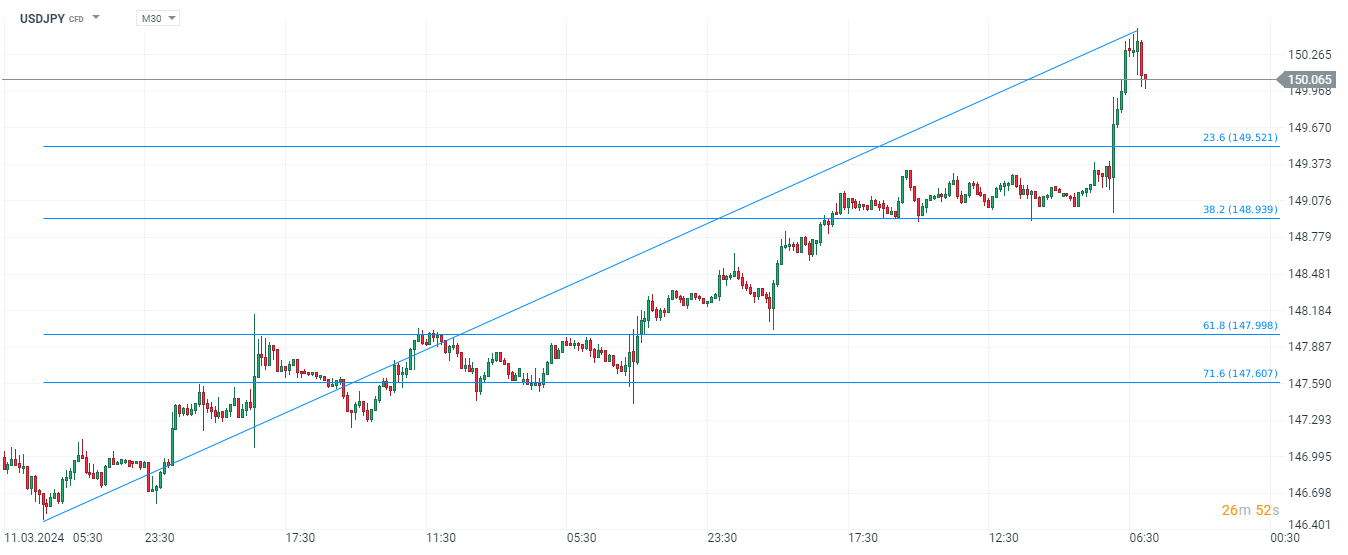The Bank of the Japan increased its key interest rate from -0.1% to a range of 0%-0.1% as wages have increased after higher than expected consumer prices rose and positive GDP growth (0.4% YoY). But the bank nor the markets don't see this decision as 'sea change' policy shift. Why? Probably wage growth peak this year will make inflation to fall below the Bank of Japan target, so the BoJ will not need to increase rates or change policy; markets see today rate hike as probably last and general stance of governor Kazuro Ueda suggest that any further hikes are also uncertain.
- Ueda questioned further wages trend, as well as smaller Japanese businesses conditions. This lead to some 'dovish' surprise, but in the last years and decades BoJ did it in very similar way, disappointing every 'hawkish' speculations
- Bank of Japan governor, Kazuro Ueda confirmed virtuous cycle of wages and prices but in general massive monetary easing such as yield curve control (YCC policy), negative rates 'which fulfilled roles' as well as accommodative financial conditions 'will be maintained for the time being'.
- Ueda also mentioned downside risks to Japanese economy and talk about situation in small Japanese businesses, which make bank 'not confident' about rising wages trend. This again lead to more dovish stance, than markets speculated about.
- Japanese Nikkei index rallied today again above 40,000 points, making another 'all-time-high' as markets see further Japanese yen drop as a longer trend, supporting earnings of leading, Japanese exporters. But not every Japanese worker is in Rengo and not everyone works in Giants such as Toyota or Nissan, so probably BoJ will be still cautious about further inflation trend and 'wage growth'.
Ueda didn't comment on short-term currency market move, but the market see BoJ stance as quite dovish which lead to pressure on JPY. In the end, it's still hard to talk about major change in Bank of Japan policy and future policy is still unclear; despite 'historic rate hike' still basic is the dovish one scenario.
Bank of Japan governor, Kazuro Ueda:
- Not just spring wage talks but solid service prices, brighter consumption outlook, improving consumer confidence as well as upgraded Capex led to a change in our stance between January and March
- Private consumption in Japan is still weak. Bank is not necessarily confident enough that wages will rise
- We will consider monetary policy response if currencies cause big impact on economy and prices
- We conducted hearings with companies smaller than the ones we usually survey
- Bank is closely watching whether trend of big wage hikes could broaden among small firms
- Real neutral rate of interest rate is hard to be identified even among central bank experts
- Ueda doesn't think that BoJ will set an upper limit in bond yields in determining the appropriate level for conducting market operations
- Japanese Governor doesn't think also about telling the definitive upper yield cap to market operations division
- According to Ueda 'sustainable, stable' achievement of 2% inflation target comes in sight
- BoJ will continue buying 'broadly same amount' of JGB (government bonds) as before
- Ueda said that the bank doesn't have preconceived notion of which could come first, reduction of bond purchases or rate hikes
- Ueada asked about scenario of wage hikes leading to higher underlying inflation and early additional hikes, said that the bank will take next month's outlook report into consideration,
- According to Ueda, today's Bank of Japan decision was made because of 'finally' increasing likelihood of achieving 2% inflation
- Upside risks include companies forward-looking wage setting behavior leads to overshoot in inflation expectations
- Downside risks include various risks in global economy, slower than expected consumption recovery
USDJPY (M30 interval)
BoJ stance as well as US dollar strength put pressure on Japanese yen. Despite that Japan Business Lobby chief, Keidanren doesn't think that 150 USDJPY level reflects Japan's economic fundamentals and speculate about strengthening yen, supported by economic fundamentals.
![]() Source: xStation5
Source: xStation5

BREAKING: US RETAIL SALES BELOW EXPECTATIONS

Economic calendar: Indices and EURUSD await US retail sales report

Morning wrap (10.02.2026)

Market wrap: Novo Nordisk jumps more than 7% 🚀
This content has been created by XTB S.A. This service is provided by XTB S.A., with its registered office in Warsaw, at Prosta 67, 00-838 Warsaw, Poland, entered in the register of entrepreneurs of the National Court Register (Krajowy Rejestr Sądowy) conducted by District Court for the Capital City of Warsaw, XII Commercial Division of the National Court Register under KRS number 0000217580, REGON number 015803782 and Tax Identification Number (NIP) 527-24-43-955, with the fully paid up share capital in the amount of PLN 5.869.181,75. XTB S.A. conducts brokerage activities on the basis of the license granted by Polish Securities and Exchange Commission on 8th November 2005 No. DDM-M-4021-57-1/2005 and is supervised by Polish Supervision Authority.

 Source: xStation5
Source: xStation5
